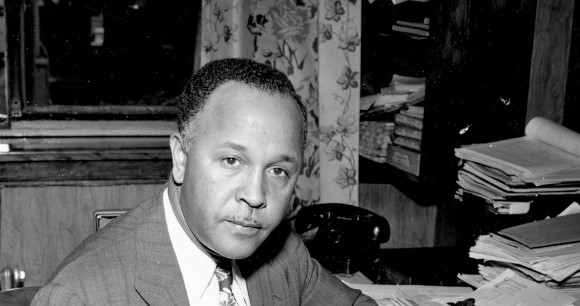
Dr. Percy Lavon Julian was an African American chemist who is most well known for extracting medicinal drugs from plants. He was born in Montgomery, Alabama on April 11, 1899 to James Sumner and Elizabeth Lena Julian. His grandparents had been slaves in the Civil War era and Julian grew up facing immense racial segregation. His parents were intent on getting a good education for their children, despite the fact that there were no high schools for black students at the time. Julian studied till 8th grade but could not finish his high school education beyond that. Undeterred, he applied to DePauw University in Greencastle, Indiana where he had to first take additional evening classes to bring himself at par with his fellow students as he hadn’t completed his high school education. Julian was not allowed to live in the college dorms or eat meals there so he had to find off campus accommodation for himself. He also held a number of odd jobs to support his education including waiting tables and working at a fraternity house, where he slept in the attic.
Percy Julian graduated from DePauw University in 1920 with honors and as the class valedictorian. He then joined Fisk University as a chemistry instructor, before receiving an Austin Fellowship in Chemistry in 1923 which allowed him to attend Harvard University. However, his teaching assistantship was withdrawn as the management felt that other students would resent being taught by an African American, so Julian left Harvard since he would be unable to complete his Ph.D. there. A few years later, he was awarded a Rockefeller Foundation fellowship which allowed him to pursue his Ph.D. at the University of Vienna. Europe was relatively free from the racial prejudice that prevailed in America, and Julian enjoyed participating in discussions and social gatherings with his peers. He received his Ph.D. in 1931 which made him one of the first few African Americans to have achieved this.
Julian then returned to America and obtained a teaching position at Howard University. He taught there for one year but his time there was marred by a scandal in both his personal and professional life. Some of his personal letters were released to the press in which he had made derogatory comments about some of his peers. He was also involved in a conflict with his laboratory assistant, who in turn blamed Julian for having an affair with his wife. These scandals forced him to resign from his teaching position but thankfully one of his former mentors, William Blanchard, offered him a teaching position at DePauw University. While at Depaw, he devised a drug treatment for glaucoma by synthesizing a chemical known as physostigmine from the calabar bean. This earned him international fame, but the university still did not offer him a full time professorship because of his race. He was also declined employment at the chemical company DuPont for the same reason.
In 1936, Percy Julian left DePauw to work as the director of research at Glidden, a company that supplied soybean oil products. A contributing factor in this was his command over German, as Glidden had just purchased a German plant to extract vegetable oil from soybeans to create paints and other products. At Glidden, he extracted a type of soy protein that was used by the U.S. Navy to produce Aero-Foam. This was a foam like substance that was used to put out oil and gas fires and was popularly used during World War II. Julian also continued his own research and contributed vastly to the process of synthesizing steroids such as progesterone, testosterone and cortisone. He left Glidden n 1953 to establish his own company by the name of Julian Laboratories. He sold this company in 1961 which made him a millionaire, a feat few African Americans had achieved before then. He then established a non-profit organization by the name of “Julian Research Institute” which he ran until his death due to liver cancer in 1975.
